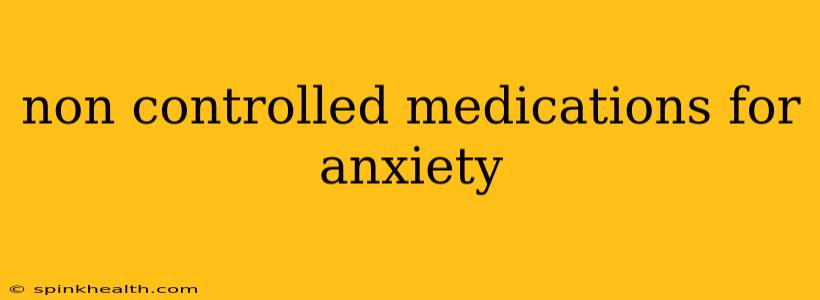Taming the Anxiety Beast: Exploring Non-Controlled Medications and Natural Approaches
Anxiety. That knot in your stomach, the racing heart, the feeling of impending doom. It’s a pervasive experience, affecting millions globally. While controlled medications like benzodiazepines offer immediate relief, they often come with potential side effects and risks of dependence. This leaves many searching for alternative, non-controlled options to manage their anxiety. This journey takes us through a landscape of both pharmaceutical and natural approaches, highlighting what's available and importantly, emphasizing the need for professional guidance.
My name is Dr. Evelyn Reed, and for over 15 years, I've been helping patients navigate the complexities of anxiety. I’ve seen firsthand the relief that both medication and lifestyle changes can bring. This article is designed to offer information, not medical advice. Always consult with your doctor or a qualified healthcare professional before starting any new treatment plan.
What are Non-Controlled Medications for Anxiety?
Non-controlled medications for anxiety generally fall into two main categories: antidepressants and anti-anxiety medications that aren't classified as controlled substances. These medications work differently than controlled substances and carry a lower risk of dependence, although side effects are still a possibility.
What are Some Examples of Non-Controlled Antidepressants for Anxiety?
Several antidepressants, particularly those classified as Selective Serotonin Reuptake Inhibitors (SSRIs) and Serotonin-Norepinephrine Reuptake Inhibitors (SNRIs), are frequently prescribed off-label for anxiety. These aren't strictly anxiety medications, but they effectively manage anxiety symptoms by influencing neurotransmitter levels in the brain. Examples include:
- SSRIs: Sertraline (Zoloft), Paroxetine (Paxil), Fluoxetine (Prozac), Citalopram (Celexa), Escitalopram (Lexapro).
- SNRIs: Venlafaxine (Effexor), Duloxetine (Cymbalta).
It's important to note that the effects of these medications can vary significantly from person to person. What works well for one individual might not be as effective for another. Finding the right medication and dosage often involves trial and error under the close supervision of a healthcare professional.
Are there Non-Controlled Anti-Anxiety Medications Besides Antidepressants?
While antidepressants are commonly used, there are other non-controlled medications sometimes prescribed for anxiety. One example is Buspirone (Buspar), which works differently from SSRIs and SNRIs, targeting serotonin receptors in the brain. However, it generally takes several weeks to achieve its full effect.
What are the potential side effects of non-controlled medications for anxiety?
Side effects are a real possibility with any medication, and non-controlled anxiety medications are no exception. Common side effects can include nausea, headache, dizziness, sleep disturbances, and changes in weight or appetite. Some individuals might experience more severe side effects. It’s crucial to discuss these potential side effects with your doctor before starting treatment.
Are there natural ways to manage anxiety?
Absolutely! Many natural approaches can be helpful in managing anxiety symptoms, often in conjunction with medication or as a standalone strategy for mild anxiety. These include:
- Exercise: Regular physical activity is a powerful stress reliever and can significantly improve mood.
- Mindfulness and Meditation: These techniques help to calm the mind and reduce feelings of overwhelm.
- Yoga and Tai Chi: These mind-body practices combine physical movement with mindfulness and relaxation.
- Dietary Changes: A balanced diet rich in fruits, vegetables, and whole grains can contribute to overall well-being and potentially improve anxiety symptoms.
- Sufficient Sleep: Aim for 7-9 hours of quality sleep per night.
- Cognitive Behavioral Therapy (CBT): A form of therapy that helps individuals identify and change negative thought patterns and behaviors.
Remember, the key is finding the right approach for you. There is no one-size-fits-all solution to anxiety management.
Conclusion: A Personalized Journey to Relief
Navigating anxiety can feel overwhelming, but understanding your options is the first step toward managing it effectively. Non-controlled medications offer a potentially safer alternative to controlled substances, but it's crucial to work closely with your healthcare provider to determine the best course of action. Remember to explore the potential of natural approaches alongside medication. Your well-being is a priority, and finding the right combination of strategies can lead you on a path toward a calmer, more fulfilling life. Don't hesitate to reach out to a healthcare professional to discuss your anxiety and explore the possibilities for treatment.

